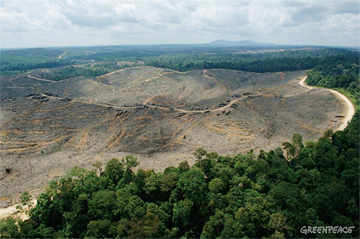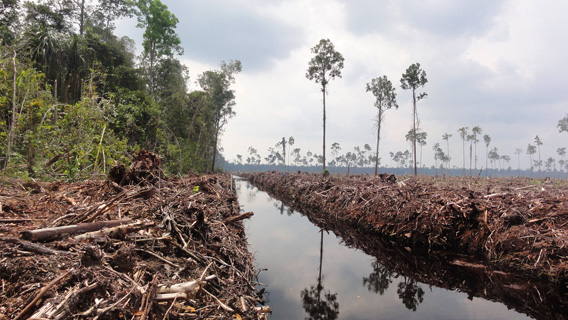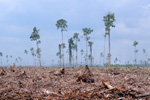
Rainforest in Sumatra
For the past decade and a half, Asia Pulp & Paper (APP) has been one of the most controversial paper producers on the planet. Environmentalists, human rights groups, and conservation scientists have blasted the Indonesian forestry giant for a long list of transgressions, ranging from illegal logging to destruction of tiger habitat to exacerbating conflict with forest-dependent people in the forests of Sumatra. Greenpeace, the Rainforest Action Network (RAN), WWF, the Rainforest Alliance, Friends of the Earth, and numerous local NGO’s have been among the many critics of APP. Their complaints have spurred dozens of major companies to drop APP directly or establish policies that exclude APP as a supplier. Via mongabay, I have reported extensively on these issues over the past several years.
Last February, APP established a forest conservation policy that commits it to protect rainforests and peatlands, avoid sourcing fiber produced via deforestation, reduce social conflict, and seek free, prior informed consent (FPIC) from communities when establishing new plantations. The policy, which went into effect February 1, 2013, applies to all the sprawling forestry giant’s operations and suppliers.
 Forest clearing in the Bukit Tigapuluh Forest Landscape in central Sumatra. Courtesy of Greenpeace. |
Understandably, the policy was met with considerable skepticism from civil society groups who have heard APP make seemingly virtuous pledges in the past, only to see it return to business-as-usual shortly thereafter. But now, almost a year into the new policy, there has been a noticeable shift in both APP’s tone and action on the ground. In a sharp departure from the past, APP has welcomed criticism from hostile NGO’s, set up a system for managing grievances, and even self-reported breaches of its deforestation moratorium. Meanwhile Greenpeace — once APP’s fiercest critic — has continued to keep its campaign against APP on hold as a good faith gesture.
But while there has been definite progress, there are still lingering concerns about APP, both in terms of whether it will continue to be a good corporate citizen moving forward and what it will do to rectify past problems. Some NGO’s continue to harbor serious doubts about APP’s long-term commitment, while others recognize the considerable institutional challenges APP faces as its tries to implement a zero deforestation policy in a country where laws aren’t always clear or enforced, competitors aren’t bound by equivalent conservation commitments, and current government policies incentivize forest clearing over preservation. Adding urgency to the situation is recent research indicating that deforestation in Indonesia is continuing at a rapid pace and increasingly industrialized, meaning that it is more important than ever to engage companies that drive forest conversion.
So in other words, APP’s forest conservation policy remains a hotly debated, yet critically important, issue. In that context, I’m pleased to announce that I will serve as the moderator for a forum taking place on the one year anniversary of APP’s forest conservation policy. The forum, which will be held February 5 in Jakarta, will involve a range of players in the debate, including APP; APP partners The Forest Trust and Ekologika; former APP critic Greepeace; and current APP critics WWF and RAN. The debate will be recorded and posted on the Internet for the world to see.

Peat draining and large-scale clearance of natural forest by APP wood supplier PT. Ruas Utama Jaya inside APP’s Senepis Tiger Sanctuary in June and October 2011. Photo courtesy of Eyes on the Forest / WWF-Indonesia, which continues to hammer APP despite its forest conservation policy.
I’m currently seeking ideas on questions to raise during the debate. If readers have anything they’d like to ask APP, its partners, or its critics, please send them my way via email, Twitter or Facebook message. This is your chance to ask the hard questions of APP and I’ll do my best to incorporate your queries into the discussion.
If you’d like further background on APP, check out Mongabay’s pulp and paper feed, which contains most of the 150+ articles I’ve written about the sector in recent years. I’ve included a few key stories below.

Highlighted Mongabay articles on APP
APP’s Borneo expansion to be constrained by forest conservation policy

(12/04/2013) Asia Pulp & Paper (APP) will not convert any blocks of forest found to have high conservation value or substantial carbon stocks as it expands in Indonesian Borneo, according the forestry giant’s managing director of sustainability. Responding to a report published by Greenomics, Aida Greenbury said APP’s 10-month-old forest conservation policy applies to four suppliers operating in East and West Kalimantan.
Deforestation accelerates in Indonesia, finds Google forest map

(11/14/2013) Forest loss in Indonesia has sharply risen over the past 12 years, reports a new study published in the journal Science. The study, led by Matt Hansen of University of Maryland, finds that Indonesia lost 15.8 million hectares between 2000 and 2012, ranking it fifth behind Russia, Brazil, the United States, and Canada in terms of forest loss. Some 7 million hectares of forest regrew during the period.
Greenpeace: APP making ‘encouraging’ progress on zero deforestation commitment

(10/29/2013) Asia Pulp & Paper (APP), an Indonesian forestry giant once notorious for destroying rainforests and peatlands, is making ‘encouraging’ progress in phasing forest destruction out of its supply chain, reports a new assessment from Greenpeace, which until recently was one of APP’s fiercest critics. The review, released today, evaluates APP’s progress on its Forest Conservation Policy, which commits the company to exclude fiber sourced from logging of natural forests and conversion of peatlands, and requires it to obtain Free, Prior Informed Consent from local communities in developing new plantations.
In transparency push, APP self-reports breach of its deforestation moratorium
(09/11/2013) In what may be an unprecedented move in the Indonesian forestry sector, Asia Pulp & Paper (APP) has announced two breaches of its moratorium on natural forest clearance. In a report published Wednesday, APP said an audit of its operations by The Forest Trust, the NGO charged with implementing the forestry giant’s forest conservation policy, turned up two incidents of forest clearance that has taken place since the logging ban took effect in February 2013.
APP answers questions on new forest conservation policy
(04/29/2013) In February, Asia Pulp & Paper, one the world’s largest paper producers, announced a forest conservation policy that would effectively exclude fiber sourced through conversion of rainforests and peatlands. The announcement however was met by skepticism by many in the environmental movement due to APP’s failures to abide by previous commitments to avoid rainforest logging.
After Indonesian paper giant commits to no deforestation, pressure mounts on its biggest competitor

(02/12/2013) After Indonesian paper giant Asia Pulp & Paper’s announcement last week that it will no longer source fiber produced from destruction of tropical rainforests, environmental groups are now urging Indonesia’s other major paper company to make a similar commitment. On Tuesday, WWF echoed Greenpeace’s call for Asia Pacific Resources International Limited (APRIL) to eliminate deforestation from its supply chain. Like APP, APRIL has been linked to large-scale conversion of Sumatra’s endangered rainforests for industrial tree plantations to produce pulp and paper.
The beginning of the end of deforestation in Indonesia?

(02/05/2013) Asia Pulp & Paper, a forestry giant that has been widely criticized for its role in driving deforestation and contributing to social conflict in Indonesia, today announced a zero deforestation policy that could have a dramatic impact on efforts to slow the Southeast Asian nation’s high rate of deforestation. The policy, which went into effect February 1, is ambitious enough that one of APP’s most vocal critics and agitators, Greenpeace, will suspend its highly-damaging campaign against the paper giant. The campaign against APP has cost the paper giant tens of millions of dollars in lost business since 2009. The new policy targets several of the major criticisms against APP, including deforestation, degradation of high carbon peatlands, conservation of critical wildlife habitat, and social conflict with local communities.
In eco-pact, will controversial paper giant APP turn over a new leaf?

(09/26/2012) Over the past decade-and-a-half there has arguably been no paper supplier as controversial as Asia Pulp & Paper (APP), an umbrella brand for several Indonesian forestry companies. The paper giant has been dogged by allegations that is destroying key wildlife habitat, driving substantial greenhouse gas emissions through the conversion of peat forests, dispossessing local communities of land, and engaging in a heavy-handed campaign to undermine its critics within Indonesia and abroad. Its reputation hasn’t be helped by its financial record — in 2001 it defaulted on $13.9 billion in debt, making it difficult for APP to raise money for expansion.
WWF: Asia Pulp & Paper misleads public about its role in destroying Indonesia’s rainforests

(12/16/2011) Asia Pulp & Paper (APP) continues to mislead the public about its role in destroying rainforests and critical tiger habitat across the Indonesian island of Sumatra, alleges a new report from Eyes on the Forest, a coalition of Indonesian environmental groups including WWF-Indonesia. The report, titled The truth behind APP’s Greenwash, is based on analysis of satellite imagery as well as public and private documentation of forest cleared by logging companies that supply APP, which is owned by the Indonesian conglomerate, Sinar Mas Group (SMG). The report concludes APP’s fiber suppliers have destroyed 2 million hectares of forest in Sumatra since 1984.

(07/27/2011) Indonesia’s forests were cleared at a rate of 1.5 million hectares per year between 2000 and 2009, reports a new satellite-based assessment by Forest Watch Indonesia (FWI), an NGO. Expansion of oil palm and wood-pulp plantations were the biggest drivers of deforestation, yet account for a declining share of the national economy. The study, which compared year 2000 data with 2009 Landsat images from NASA, found that Indonesia’s forest cover declined from 103.32 million hectares to 88.17 million hectares in ten years. Since 1950 Indonesia lost more than 46 percent of its forests.
Does chopping down rainforests for pulp and paper help alleviate poverty in Indonesia?

(01/13/2011) Over the past several years, Asia Pulp & Paper has engaged in a marketing campaign to represent its operations in Sumatra as socially and environmentally sustainable. APP and its agents maintain that industrial pulp and paper production — as practiced in Sumatra — does not result in deforestation, is carbon neutral, helps protect wildlife, and alleviates poverty. While a series of analyses and reports have shown most of these assertions to be false, the final claim has largely not been contested. But is conversion of lowland rainforests for pulp and paper really in Indonesia’s best economic interest?